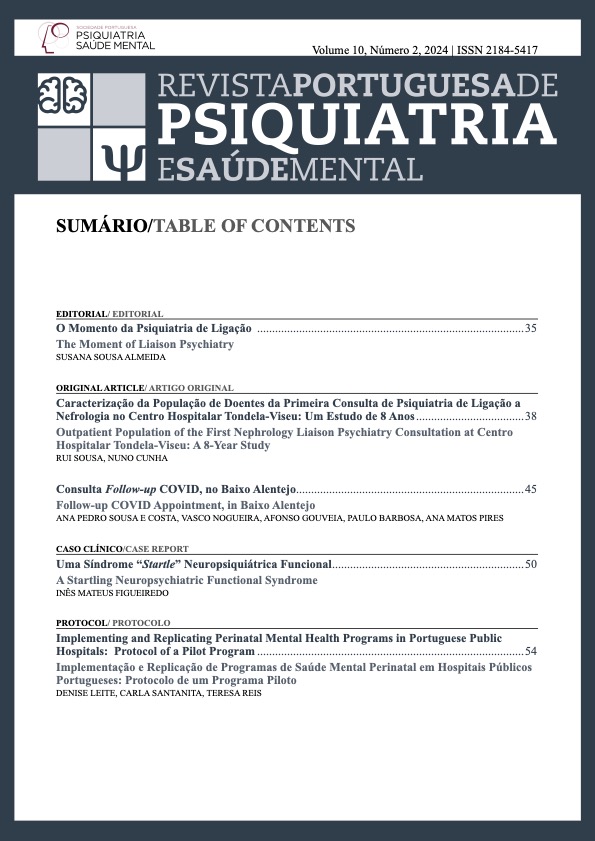A Startling Neuropsychiatric Functional Syndrome
DOI:
https://doi.org/10.51338/rppsm.480Keywords:
Nervous System Diseases/diagnosis, Reflex, StartleAbstract
Startle syndromes are heterogeneous groups of disorders and this paper reports an uncommon neuropsychiatric syndrome to alert the medical community to these conditions and their diagnostic and treatment implications. A 35-year-old male was brought to the Psychiatric Emergency Room due to sudden behavioral changes and mutism. Exhibiting fever and exuberant limb startle reflexes when elicited by the menace reflex and tactile stimulation, the neurologist was called. He had a history of previous hospitalizations due to schizoaffective disorder and he had suspended his antipsychotic medication. All requested exams (MRI, EEG, lumbar puncture, lab tests) were normal, except for hyperglycemia, hypophosphatemia and hyperglycorrachia. Excluded several organic causes, a functional neuropsychiatric Startle syndrome appears as the most probable diagnosis. It is an unusual clinical presentation with an overlap of physical signs shared with other neurological disorders, which demands a multidisciplinary approach to establish the correct diagnosis and not delay the correct treatment.Downloads
References
Bakker MJ, van Dijk JG, van den Maagdenberg AM, Tijssen MA. Startle syndromes. Lancet Neurol. 2006;5(6):513-524. doi:10.1016/S1474-4422(06)70470-7
Moseley BD, Shin C. Adult onset startle epilepsy. BMJ Case Rep. 2011;2011. doi:10.1136/bcr.09.2011.4801
Saini AG, Pandey S. Hyperekplexia and other startle syndromes. J Neurol Sci. 2020;416:117051. doi:10.1016/j.jns.2020.117051
Mine J, Taketani T, Yoshida K, et al. Clinical and genetic investigation of 17 Japanese patients with hyperekplexia. Dev Med Child Neurol. 2015;57(4):372-377. doi:10.1111/DMCN.12617
Černis E, Freeman D, Ehlers A. Describing the indescribable: A qualitative study of dissociative experiences in psychosis. PLoS One. 2020;15(2). doi:10.1371/journal.pone.0229091
Anzellotti F, Dono F, Evangelista G, et al. Psychogenic Non-epileptic Seizures and Pseudo-Refractory Epilepsy, a Management Challenge. Front Neurol. 2020;11:461. doi:10.3389/fneur.2020.00461
Pal PK. Electrophysiologic Evaluation of Psychogenic Movement Disorders. J Mov Disord. 2011;4(1):21-32. doi:10.14802/jmd.11004
Hinson VK, Haren WB. Psychogenic movement disorders. Lancet Neurol. 2006;5(8):695-700. doi:10.1016/S1474-4422(06)70523-3
Peckham EL, Hallett M. Psychogenic Movement Disorders. Neurol Clin. 2009;27(3):801-819. doi:10.1016/j.ncl.2009.04.008








